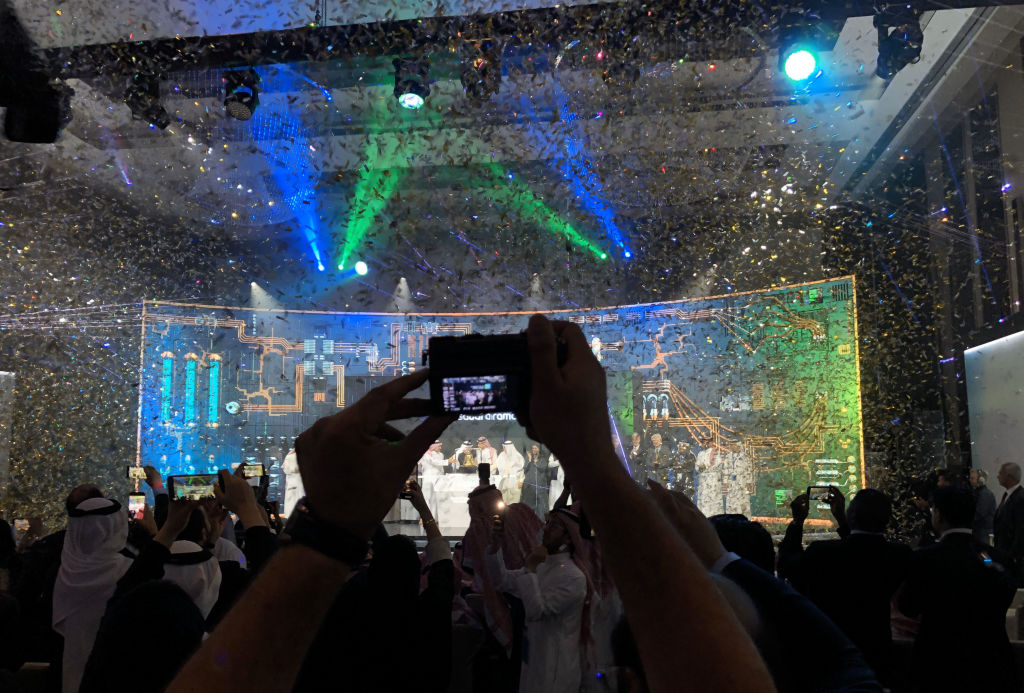
In a festive opening to the sale of its best known company, Saudi political and economic elite were out on Wednesday to show their full support for the sale of their country’s crown jewel.
Saudi Arabia’s Aramco oil company had its first IPO on Wednesday and is now being heralded as the world’s most valuable company with a worth of $2 trillion. This state-owned oil giant provides nearly 10% of the world’s oil supply and its sale of shares to private individuals and investors was always sure to illicit great interest. But does this IPO reflect the true value of the company or is it smoke and mirrors? Until this IPO is held on a Western stock exchange, we may never know.
Aramco is indeed a relatively well-managed and highly profitable company. With some of the world’s lowest cost production of oil in the world, solid portfolio diversification, and a history of apt management, it is no wonder that Saudi’s ambitious Crown Prince Mohammad bin Salman (known as MBS) chose to sell Aramco over other Saudi companies.
In an effort to bring global attention to the commercial and investment opportunities in Saudi Arabia, MBS wanted to highlight the best the Kingdom has to offer the international business community. Right now, the country is greatly in need of a cash infusion in a time of lower than expected oil prices, downgrading of its expected GDP growth rates by the International Monetary Fund, and big price tags on splashy government initiatives. But the desire to sell Aramco is also about getting the world to pay attention to Saudi Arabia’s economic diversification and its potential business opportunities.
Saudi Arabia unveiled a 650-page prospectus to investors and in it revealed previously murky details of Aramco finances, its expectations of having 70 years left of proven oil reserves in Saudi Arabia, and its relatively lower carbon-intensive impact on the environment. But Aramco was not willing to provide the stricter disclosure requirements to list on Western stock exchanges. Details of what arrangement Aramco has with the Saudi government in its payment of royalties, taxes and dividends is still largely unknown. After years of trying to get Western stock exchanges to accept weaker disclosure details, Saudi Arabia was unwilling to completely open Aramco’s books for scrutiny. Instead of offering up to 5% of Aramco for sale, as initially discussed, the government opted for selling 1.5% of Aramco on the local Saudi Tadawul stock exchange.
Listing Aramco on Tadawul not only thwarted thorny disclosure requirements, but was also a symbolic win for MBS’ nationalist vision of his country’s future. The sale of Aramco put the Saudi stock exchange on the global map. Saudi’s stock exchange was now trading a volume of market capitalization that was equivalent to that of Germany’s. This was a moment of great pride in Saudi Arabia.
However, were Saudi individual investors pressured to buy shares in this high profile IPO? It is difficult to forget the November 2017 shake-down of hundreds wealthy Saudis who were arrested in the Riyadh Ritz-Carlton until they signed over assets worth somewhere between $400 and $800 billion. In such a political environment it is not inconceivable that some of Saudi’s financial elite were encouraged, or even pressured, to prove their sense of national duty and buy shares in this IPO.
To add more doubt to the genuineness of Saudi businesses’ reaction to the IPO, it is hard to forget that it had been widely reported for years that MBS wanted and even expected the valuation of Aramco to hit $2 trillion. Despite months of external assessment of its prospectus, few if any large international investors believed the valuation could exceed $1.8 trillion and they often projected Aramco to be worth far less.
If and when Aramco shares are open for sale to international investors on Western stock exchanges, we will then know the true value of Aramco shares. The potential of political pressure being exerted on Saudi businesses to show their patriotic colours before a zealous authoritarian like MBS sows doubt into how much the Aramco IPO was really worth.
More Must-Reads from TIME
- Why Biden Dropped Out
- Ukraine’s Plan to Survive Trump
- The Rise of a New Kind of Parenting Guru
- The Chaos and Commotion of the RNC in Photos
- Why We All Have a Stake in Twisters’ Success
- 8 Eating Habits That Actually Improve Your Sleep
- Welcome to the Noah Lyles Olympics
- Get Our Paris Olympics Newsletter in Your Inbox
Contact us at letters@time.com